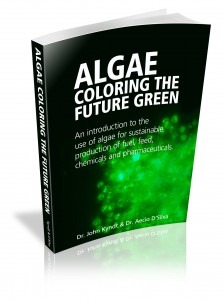By: Dr. John Kyndt – Head Scientist of the Renewable Energy Program at Advanced Energy Creations Lab .
 An issue often overlooked by scientists, politicians and media reporters that are advocates of replacing all fossil-based crude oil with a green renewable resource, is the fact that many byproducts from current oil refining are playing an essential role in our everyday lives.
An issue often overlooked by scientists, politicians and media reporters that are advocates of replacing all fossil-based crude oil with a green renewable resource, is the fact that many byproducts from current oil refining are playing an essential role in our everyday lives.
Today, as much as 10% of all crude oil is used for the production of industrial chemicals. Overall, these chemicals are significantly more economically valuable than transportation fuels. Think of all the household products, paints and plastics we are using on a daily basis.
About 95 % of all the chemicals we use in our everyday lives trace back to fossil fuel petrochemicals, and the majority of these can be traced back to only seven basic building blocks: methanol, ethylene, propene, butadiene, benzene, toluene and xylene.
These seven building blocks essentially originate from crude oil as a starting point. It is clear that our society in its current form is strongly dependent on crude oil and any alternative sustainable resource that intends to replace fossil oil, should be able to supply not only the transportation fuel demand, but also feed into the billion dollar chemical industry.
To make any non fossil crude oil into a viable petrol oil replacement it is important to maximize the use of renewable resources that are being used for fuel production. In an ideal world, a truly renewable and sustainable resource would let nothing go to waste. Once the biomass is extracted of its fuel sources (e.g. lipids or carbohydrates from algae, sugar-cane, jatropha), the leftover would ideally be used for the production of viable byproducts.
As we all realize, current renewable feedstocks are far from ideal at this point in time, however, small scale developments are exploring cost-efficient ways to convert glycerol (a major byproduct from biodiesel production) and partly purified ethanol into high value chemicals.
These chemicals can then be building blocks for the ever-growing chemical product industry. A processing scheme that branches the renewable resource into several valuable products (ranging from fuels to green chemicals or even simply animal feed) could make the overall production economically viable.
The current focus in the media and government funded projects is on the production of fuel as an end product from biomass from plants, algae or other renewable sources, without too much focus on the use of byproducts. However, there is emerging research, by our group and other scientists in the world, on chemicals that can be produced from most biomasses.
The initial focus seems to be on chemicals that are the same as the ones produced from fossil oil sources. All of these are major building blocks for daily life products, like plastics, coatings, and cosmetics and can be fed directly into the current main stream chemical industry.
In addition, we focus on production of alternative green chemicals that are currently not being produced from fossil fuels, but have a real potential to replace the current petrochemicals (like lactic acid and propanediols) in a not so far away future.
With the design of all of these chemicals it is important to realize that special attention should be given to keep the overall process renewable and sustainable. This is critical to maintain the sustainable image of the feedstock.
Therefore, we believe that incorporating a green chemical production platform into any green/biofuel program is a valuable strategy from an economical and sustainable point of view.
More info about Algae for Green-Bio-Fuels



this post is very usefull thx!
i have enjoyed reading thank for sharing your story Greeting.
This is an interesting algae article. Thanks for sharing.
Keep posting stuff like this i really like it
great experience, dude! thanks for this great post wow… it’s very wonderful report.
Really good sharing this.
very well
information you write it very clean. I’m very lucky to get this information from you about biofuels.
really appreciate your site and info — thanks a lot!